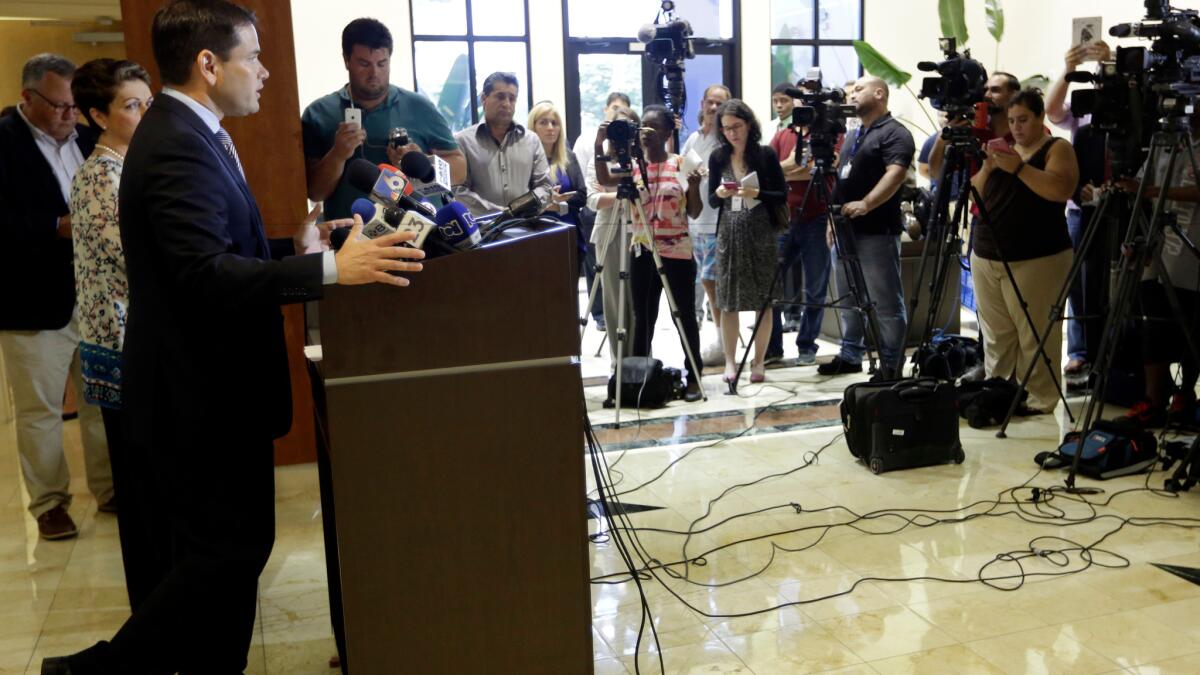Op-Ed: Disability rights and reproductive rights don’t have to be in conflict

- Share via
Earlier this month, Florida Sen. Marco Rubio stated that women infected with the Zika virus, which can cause congenital disabilities such as microcephaly, should not be permitted to have legal abortions. In March, Indiana Gov. Mike Pence, now the Republican nominee for vice president, signed a bill banning abortions following a prenatal diagnosis of Down syndrome or related conditions. Similar bills have passed or are pending in other states.
Underlying these anti-abortion measures is the widespread assumption that pregnant women will rush to abort if they discover that their children will be born with a disability. This leads, in turn, to the assumption that reproductive rights and disability rights are in conflict.
Mass media and our politicians repeatedly send out the false message that disability equals suffering.
It doesn’t have to be that way. We are parents of children with disabilities who are also pro-reproductive rights. David Perry’s 9-year-old son has Down syndrome. Elizabeth Picciuto’s 6-year-old son has Cri du Chat syndrome and microcephaly. Rather than limit women’s rights, we believe we must build a more understanding, accessible society that supports people with disabilities and provides services to parents. That’s how we can safeguard access to abortion while ensuring that it isn’t the only feasible option following a prenatal diagnosis.
The first step is to educate the public. Mass media and our politicians repeatedly send out the false message that disability equals suffering. Disabled people do suffer and struggle. But much of that suffering is caused by correctable injustices: lack of resources, lack of accessibility or lack of knowledge.
Amy Sequenzia, an autistic adult, advises parents not to try to “fix” their children so they are no longer disabled, but to “improve how the world will see and treat the children so that they can have accessibility and supports, and also be safe to live disabled.” Following that advice could take us a long way toward a world in which the reception of a prenatal diagnosis of disability is met not with fear, but with hope.
Step two: Recognize that all disabled lives have meaning. Some might say such acceptance is all well and good for mild disabilities, but not severe disabilities like microcephaly. This distinction is unwarranted. Many “mildly” disabled people still need a lot of support, while many who are “severely” disabled can lead fuller lives than may be readily apparent.
When Picciuto’s son Edmund was born, she was told based on brain MRIs that he would never walk, talk or recognize anyone or anything in his environment. Like many initial prognoses, that turned out to be far too pessimistic. While most would still count him severely disabled, he has loving relationships with family and friends, plays games, laughs at silly jokes and wants screentime far too often. Perry’s son is mostly non-speaking, but his teachers call him “The Mayor” because of the way he moves through the building, greeting each student and adult as he walks.
People who are severely disabled, given the right environment, can still thrive, love, achieve their goals, and in turn make the world a better place.
The final step is to recognize the stakes.
Many people who reprove the notion of abortions based on sex (or if prenatal testing technology were more advanced, sexual orientation, or eye color) make an exception for abortions due to disability. They seem to believe that disabled people will be so unhappy, or make their parents so unhappy, that it would be better if they were not born. Such a distinction points to the inherent ableism within American society. We must do better; we must find a way to fairly and consistently handle the ethical complexities of widely accessible, and ever more precise, prenatal diagnostic technology.
We don’t mean to minimize the challenges facing disabled people and their families. We know all too well that the world is still far from being an ideal place to raise a disabled child.
But the answer isn’t to force pregnant women to give birth. The best way to open up new possibilities for women after a prenatal diagnosis is to guarantee that disabled children are well-supported with the services they need, that they have adequate medical care, and access to great schools. If the Rubios and Pences of the world really want to make a difference, they could work to ensure that communities are empowered to welcome and include disabled people, not to shut them out.
David Perry is a disability rights journalist and history professor at Dominican University. Elizabeth Picciuto is a contributing writer at the Daily Beast and philosophy lecturer at University of Maryland, Baltimore County.
Follow the Opinion section on Twitter @latimesopinion and Facebook
More to Read
A cure for the common opinion
Get thought-provoking perspectives with our weekly newsletter.
You may occasionally receive promotional content from the Los Angeles Times.










